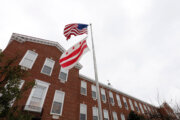For more than a year, religious organizations have lobbied Congress and the Biden administration to fix a sudden procedural change in how the government processes green cards for religious workers, which threatens the ability of thousands of them to continue to minister in the United States.
The Catholic Diocese of Paterson, New Jersey, and five of its priests whose legal status in the United States expires as soon as next spring, have now sued the federal agencies overseeing immigration. They argue that the change “will cause severe and substantial disruption to the lives and religious freedoms” of the priests as well as the hundreds of thousands of Catholics they serve.
“Our priests feel we’re doing the best we can,” said Bishop Kevin Sweeney, whose dioceses covers 400,000 Catholics and 107 parishes in three New Jersey counties.
Paterson is the first diocese to bring this suit against the Department of State, Department of Homeland Security and the U.S. Citizenship and Immigration Services, said Raymond Lahoud, its attorney in the lawsuit.
But “there is a buzz out there” among similarly impacted religious groups, Lahoud added, because of how reliant many are on foreign-born clergy who build strong ties in their U.S. parishes.
“It’s so disruptive,” said Bishop Mark Seitz, who chairs the committee on migration for the U.S. Conference of Catholic Bishops. The group has advocated for legislative and administrative fixes because the newly extralong delays in green card processing are “ not sustainable.”
In his own border diocese of El Paso, Texas, Seitz is facing the possibility of losing priests whose permanent residency cases now have little chance to be approved before their visas expire. The law mandates them to leave the United States for at least a year.
“One is pastor of a large, growing parish. Now I’m supposed to send him away for a year, put him on ice, as it were — and somehow provide Masses?” Seitz said.
To deal with a shortage of religious workers that has worsened in recent decades, American dioceses have long had agreements with foreign dioceses to bring in seminarians, priests and nuns from places as different as Poland, the Philippines and Nigeria, said the Rev. Thomas Gaunt of Georgetown University’s Center for Applied Research in the Apostolate.
Most other faith denominations from Buddhism to Islam to Pentecostal Christians also recruit foreign-born clergy, for reasons ranging from the need to minister to growing non-English-speaking congregations to specialized training at foreign institutions steeped in a religion’s history.
Most such “religious workers,” in the U.S. government’s definition, come under temporary visas called R-1, which allow them to work in the United States for five years. That used to be plenty enough for an organization to assess if the clergy were in fact a good fit and then petition for permanent resident status — known as green cards — for them under a special category called EB-4.
Congress establishes a maximum number of green cards available per year per category, which is generally either based on types of employment or family links to U.S. citizens. The wait time depends on whether and by how much the demand exceeds the visas available in each category.
Citizens of countries with especially high demand get put in separate, often longer “lines” — currently, the most backlogged category is for the married Mexican children of U.S. citizens, where only applications filed more than 24 years ago are being processed.
Neglected or abused minors from Guatemala, Honduras and El Salvador — a surging number of whom have sought humanitarian green cards or asylum after illegally crossing into the U.S. since the mid-2010s — were also in a separate line. But in March 2023, the State Department announced that was a mistake and immediately started adding them to the general queue with the clergy.
That’s created a backlog that currently stands at more than 3.5 years and could increase. Some estimate it could take 10-15 years to get these green cards.
“This is an untenable situation,” said Lance Conklin, who co-chairs the religious workers group of the American Immigration Lawyers Association and often represents evangelical pastors. “The lawsuit is representative of the way a lot of people feel.”
The lawyers’ association, together with the bishops’ conference and other organizations, has been lobbying for long-term Congressional fixes — which most recognize will be hard to obtain given the political sensitivity of immigration reform — as well as simpler administrative changes that the agencies could implement quickly.
Among those, attorneys and advocates say, would be allowing applicants to change ministry jobs — moving from associate pastor to senior pastor, or relocating to a different convent, for example — without losing their place in the green card line. Or the government could reduce the time they need to spend outside the United States after their visa expires before they can get another one.
“We could deal with a month,” Seitz said, while the current required time is 12 months.
Most organizations are staying the course for now, hoping and praying that the administration will make at least these temporary fixes — perhaps nudged by the lawsuit, filed in August in U.S. District Court in New Jersey.
That’s largely because they don’t have other options.
Different employment visas and green cards are far more laborious and expensive to apply for, and many clergy don’t qualify. For instance, those not receiving any salary cannot show they’re being offered “prevailing wages,” one of the requirements meant to protect U.S. native workers in non-religious employment categories.
That’s often the case for Catholic nuns, said Mary O’Leary, a Michigan attorney who represents religious orders.
“A lot of religious orders are not wealthy,” she said. “They’re not like Microsoft, you can’t go to a business school or computer science school and recruit.”
In the Archdiocese of Chicago, a nun who works as a school aid has to leave the country when her visa expires in a couple of weeks, said Olga Rojas, the archdiocese’s senior counsel for immigration.
“This principal is so devasted,” Rojas said, adding that across the U.S. religious workers have already been forced to leave. “They want to stay and finish their work.”
In some cases, their organizations are trying hard to bring the religious workers back from overseas, said Miguel Naranjo, the director of Religious Immigration Services for Catholic Legal Immigration Network.
“It’s beyond ministry,” Naranjo added, because they often provide education, healthcare, youth and other social services. “They’re the last safety net of many communities.”
___
Associated Press religion coverage receives support through the AP’s collaboration with The Conversation US, with funding from Lilly Endowment Inc. The AP is solely responsible for this content.
Copyright © 2025 The Associated Press. All rights reserved. This material may not be published, broadcast, written or redistributed.







